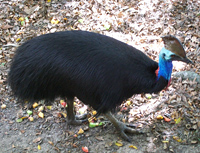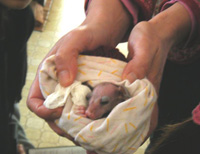
AJWCEF'S Wildlife
Conservation Activities
 Plants
and animals each play an important role in the natural
environment. The loss of just a single species can have a
significant impact on the natural environment. Do you
know about the cassowary, a large Australian bird? It lives
in tropical rainforests and its main diet is seeds. Several
plant varieties in these rainforests actually need to be
consumed by the cassowary and pass through its digestive
system in order to germinate. Cassowaries in the state of
Queensland are now endangered, and their extinction could
mean extinction for these particular plants. Plants
and animals each play an important role in the natural
environment. The loss of just a single species can have a
significant impact on the natural environment. Do you
know about the cassowary, a large Australian bird? It lives
in tropical rainforests and its main diet is seeds. Several
plant varieties in these rainforests actually need to be
consumed by the cassowary and pass through its digestive
system in order to germinate. Cassowaries in the state of
Queensland are now endangered, and their extinction could
mean extinction for these particular plants.
AJWCEF
approaches wildlife conservation from a perspective of
protecting the ecosystem of the planet, and seeks to rescue
sick and injured wildlife so that they may one day be
returned to the natural environment. As such, we support
the efforts of Queensland government facilities such as the
Moggill Koala Hospital. Donations received go to such items
as medicine and the like to treat wildlife.
 Caring
for orphaned animals who have lost their parents to cars,
etc., is another important element. Many of Australia's
animals are marsupials, meaning that the young are raised in
their mother's pouch. Even if the mother is killed through
an accident, the young inside the pouch are often protected.
This is where qualified animal carers step in to be a
substitute mother and raise the young to a point where they
can be returned to the wild. People who undertake this task
are volunteers, and they bear the full cost of the milk and
other equipment required. The AJWCEF supports the
"grass-roots" activities of organizations such as the
Ipswich Koala Protection Society, and you can help keep an
orphan alive by making a donation so that milk or blankets
can be purchased for use in their care. Caring
for orphaned animals who have lost their parents to cars,
etc., is another important element. Many of Australia's
animals are marsupials, meaning that the young are raised in
their mother's pouch. Even if the mother is killed through
an accident, the young inside the pouch are often protected.
This is where qualified animal carers step in to be a
substitute mother and raise the young to a point where they
can be returned to the wild. People who undertake this task
are volunteers, and they bear the full cost of the milk and
other equipment required. The AJWCEF supports the
"grass-roots" activities of organizations such as the
Ipswich Koala Protection Society, and you can help keep an
orphan alive by making a donation so that milk or blankets
can be purchased for use in their care.
 Many
animals are also under threat due to habitat loss caused, in
part, by urbanization. One species threatened by habitat
loss is the northern hairy-nosed wombat, of which only 130
or so remain and they are found solely in the Epping Forest
National Park, Queensland. The AJWCEF supports projects
seeking to establish new colonies of such endangered
species, secure habitat so that they can live in peace, and
activities such a eucalypt reforestation. Many
animals are also under threat due to habitat loss caused, in
part, by urbanization. One species threatened by habitat
loss is the northern hairy-nosed wombat, of which only 130
or so remain and they are found solely in the Epping Forest
National Park, Queensland. The AJWCEF supports projects
seeking to establish new colonies of such endangered
species, secure habitat so that they can live in peace, and
activities such a eucalypt reforestation.
 Recent
years have seen the issue of global warming and climate
change become more pressing. Being a vast and dry continent,
Australia experiences large-scale bushfires, and there are
concerns that climate change and potentially more frequent
bushfires are having a major impact on the ecosystem. Much
research is still to be done in this area, however, and the
AJWCEF supports universities and other research institutes
to this end. Recent
years have seen the issue of global warming and climate
change become more pressing. Being a vast and dry continent,
Australia experiences large-scale bushfires, and there are
concerns that climate change and potentially more frequent
bushfires are having a major impact on the ecosystem. Much
research is still to be done in this area, however, and the
AJWCEF supports universities and other research institutes
to this end.
To 'Activities' ←
TOP ←
|
|
|